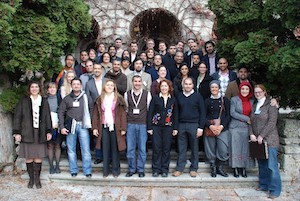Islamophobia/anti-Muslim hate
Islamophobia has increasingly become weaponised by the far-right and even within some mainstream political parties.
Islamophobia, recognised by most to be a form of racism or bigotry against Muslims or those perceived to be Muslims, is a rapidly growing phenomenon, threatening the cohesiveness of multicultural societies around the world.
Since its founding, ISD has produced research and initiatives not only identifying Islamophobia as a key component of the hate landscape, but has invested in initiatives and partnerships to help mitigate its impact.
Building resilience
In 2008, ISD helped launch the CEDAR Network, a pan-European network of Muslim professionals aimed at helping Muslim communities build confidence and resilience in the face of exclusion and mistrust. This was followed by a landmark study in 2010 documenting Islamophobic narratives, Muslims in the European Mediascape, and the European Muslim Women of Influence (EMWI) awards, which highlighted the contributions of Muslim women leaders.
In 2010, ISD also seeded the Phoenix Initiative, an “inter-community initiative for a new centre ground” that brought together leading Muslim and Jewish leaders and thinkers to bridge gaps within their communities to tackle some of the harder and more divisive social issues in a way that would avoid resorting to reactionary narratives.
Following the October 7, 2023 attacks by Hamas on Israel, ISD discovered a spike in antisemitism and Islamophobia in corporate workplaces through its engagement with Fortune 100 companies. ISD has worked with these companies to establish classification frameworks for Islamophobia, ad hoc advisory for individual cases, and awareness training for leadership and staff. This has been done without the need for surveillance, sharing of sensitive data, or involvement in disciplinary procedures. It has also allowed for more effective mitigation of hate-related conflict and for the provision of resources to improve dialogue and cohesion.
Supporting civil society
Through initiatives supported by Google.org and others, such as the £1m Google Innovation Fund (2018) and the €10m Google Impact Challenge on Safety (2019), we have funded projects that have addressed anti-migrant and anti-Muslim attitudes in the UK and Europe:
Virtual Inclusion, by the Open University, created three 10 minute 3D, multi-user VR experiences so that young people could experience first-hand the “lives” of people from
socially excluded communities, such as Muslims and migrants.
Who Do You Think We Are? by Brighter Futures was a series of podcasts created by and for young people that presented positive, varied and unexpected identities of young migrants, mainly Muslims from North Africa and the Middle East.
Remember Together by British Future highlighted Muslim WWI contribution as well as the relevance of WWI service and remembrance for Islam in Britain.
In Kenya, we helped civil society organisations produce anti-Islamophobia campaigns during the 2017 elections, when divisions between Muslims and Christians were likely to be exploited, particularly against poorer Muslims on the east coast of Kenya. These campaigns are highlighted in the ISD report, Between Two Extremes.
Understanding the online landscape
In 2018, ISD tested the mapping of anti-Muslim hate online through proprietary technology produced in partnership with the London Mayor’s Office for Policing and Crime (MOPAC) and in the State of Victoria, Australia. This mapping was able to provide hate speech data at a borough or neighbourhood level and is a model that can be used in any large city. Later that year, ISD provided evidence to the All Party Parliamentary Group on British Muslims for a definition of Islamophobia that has since been adopted by most UK political parties.
Also in 2019, ISD published Mapping Hate in France: A Panoramic View of Online Discourse, a data-driven overview of a variety of forms of hateful speech online in France that identified just under seven million instances of online hateful speech against women; lesbian, gay, bisexual, transgender and queer (LGBTQ) communities; people with disabilities; and French Arab communities. This included approximately 131,000 instances of anti-Arab hateful speech.
During the 2020 US election campaigns, we provided cutting edge research about online Islamophobic trends being used by political actors and disinformation agents, including the abuse of Muslim candidates for public office (as documented in the ISD report, Public Figures, Public Rage: Candidate abuse on social media). We also worked with a wide range of Muslim civil society organisations to help them defend against disinformation, cyber attacks and abuse online.
In 2023, ISD monitored online Islamophobia and antisemitism before, during, and after the October 7th attacks by Hamas on Israel, finding that online hate seen through over 50,000 YouTube comments spiked between 43 and 51%, measured across a range of Islamophobic and antisemitic tropes. This was used to gain a better understanding of how the Israel/Palestine conflict influences antisemitism and Islamophobia respectively.
More recently during the riots that followed the Southport, England stabbing attack in the summer of 2024, ISD tracked anti-migrant and anti-Muslim narratives that were seeded online and shared by large accounts, including the rapid spread of algorithm-amplified disinformation about the Southport attacker – 30,000 mentions from over 18,000 accounts within 24 hours – that ultimately provoked a violent response.

Inaugural CEDAR Network gathering
Salzburg, Austria, September, 2008

Mapping of anti-Muslim hate by borough
London, England, 2017

Testing of a VR tool by Open University
that addresses anti-Muslim, anti-immigrant,
and racist bullying in schools, funded
through the Google Innovation Fund, 2018
Canada’s online ecosystem of hate is thriving
The horrific killing of a family in London, Ont., has once again brought into urgent focus the landscape of anti-Muslim hate that is increasingly prevalent in Canada, both online and offline. Read more at the Globe and Mail
#CoronaJihad: COVID-19, Misinformation, and Anti-Muslim Violence in India
We examine the trajectory that has led the world’s largest democracy to scapegoat Muslims for what has been termed #CoronaJihad. Read more at the Strong Cities Network
Podcast: Monetising Islamphobia
In this episode Zahed Amanullah, a Resident Senior Fellow at the Institute for Strategic Dialogue, explains how Islamophobia has been refined, amplified and duplicated into a process that is being used globally.
The Synthetic Society: Monetising Islamophobia
ISD’s Islamophobia and Hate Speech team

Moustafa Ayad
Executive Director; Africa, the Middle East and Asia (AMEA)


Zahed Amanullah
Resident Senior Fellow, Networks & Outreach


Rashad Ali
Senior Fellow


Milo Comerford
Director of Policy & Research, Counter-Extremism


Jakob Guhl
Director of Policy and Research, Counter-Extremism, Europe

